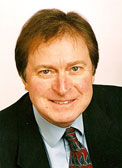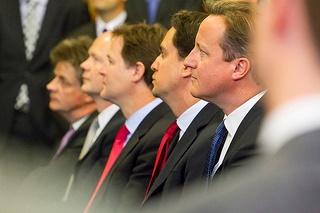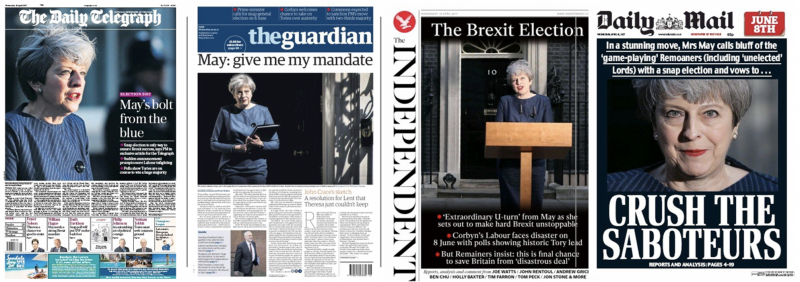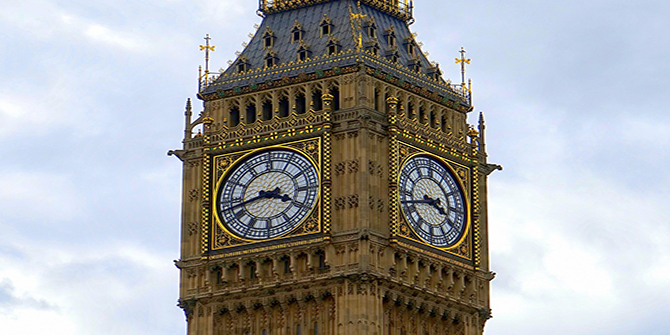 There is a growing trend for people to come into politics more or less straight from university. They are undoubtedly clever but this does not compensate for a deficiency of experience in other walks of life that might inform their political judgements. Tony Wright argues that as the recruitment agency for politicians – the political party – loses its popular base, finding ways to make the selectorate more diverse becomes more urgent.
There is a growing trend for people to come into politics more or less straight from university. They are undoubtedly clever but this does not compensate for a deficiency of experience in other walks of life that might inform their political judgements. Tony Wright argues that as the recruitment agency for politicians – the political party – loses its popular base, finding ways to make the selectorate more diverse becomes more urgent.
There is no shortage of reasons why, beyond particular events like the fiddling of expenses, people might take a dim view of politicians. Politicians today are perceived as inhabiting a political bubble of their own making. It is now a generation ago that Anthony King produced his pioneering analysis of the rise of the ‘career politician’ in Britain, with its treatment of politicians as an occupational category. He charted the way in which, by the 1980s, the non-career politician had virtually disappeared from the top of British politics, a trend which has consolidated itself since. This might be inevitable, but one of its consequences was that we are increasingly being governed by people with a diminished experience of the world beyond politics.

A little caution is needed before we dismiss politicians as completely detached from reality. Firstly, the constituency system ensures that politicians have to encounter the people they represent on a regular basis (unlike in those systems where regional party lists enable politicians to float above their electorates). Secondly, there is now an obsessional concern with knowing what the electorate is thinking and feeling about everything at all times. Thirdly, it is difficult to see parliaments of the past (almost entirely composed of men) as somehow more representative than parliaments of today.
When all this is properly said, though, there is a charge that does carry more weight. It has been nicely expressed by Lord Turnbull, a former cabinet secretary:
There is a growing trend for people to come into politics more or less straight from university. They lick envelopes in Central Office, become a Special Adviser, and on and on it goes, and by the time they are in their mid-thirties they are Cabinet ministers, barely touching the sides of real life.
The fact that all three main party leaders currently fit this sort of stereotype gives it a particular force. In fact the picture is rather more complicated (and requires more detailed evidence than we currently have), but there is enough truth in it to feed a developing public sense that politicians increasingly inhabit a closed political world of their own and lack experience and understanding of other worlds and lives. As I heard someone express this recently: ‘if they have never had to worry about paying the gas bill how can they represent people like me?’ This can easily become the perception that it is only the game of politics itself that they are interested in, and the rewards that go with it, rather than any wider purpose.
King also warned of another consequence:
It is hard to escape the conclusion that the demise of the non-career politician has led to a certain loss of experience, moderation, detachment, balance, ballast even, in the British political system.
If this kind of analysis of politicians as an occupational category was an interesting academic exercise a generation ago, it has now become a matter of pressing political interest. We increasingly want to know who politicians are and where they have come from (and how we can exercise some control over what they do).
It may have been Aristotle who first identified the need for politicians to know ‘where the shoe pinches’, but the general absence of this kind of shoe-pinching knowledge among today’s politicians is now widely noticed. They are certainly clever—perhaps more clever than ever, furnished with their degrees in Politics, Philosophy and Economics and the like—but this does not make them wise. Nor does it compensate for a deficiency of experience of other walks and conditions of life that might inform their political judgements. When people say that they think politicians are ‘out of touch’, these are the sort of considerations they have in mind.
This in turn leads to the quest for that elusive quality of authenticity in politicians, and for ways in which the talent pool of politics can be widened and deepened. Some politicians have understood that authenticity is now the most useful asset they can possess, which has produced the bogus authenticity of a Boris Johnson and the saloon-bar simplicities of a Nigel Farage. They trade in the fact that they are not seen as ‘normal’ politicians but this does little to increase diversity in politics.
Finding ways to expand the selectorate becomes more urgent as the political party, which is the recruitment agency for politicians, loses its popular base. The collapse of membership and attachment not only concentrates power at the top of the party, but also narrows still further the already small group of people involved in the selection, and re-selection, of politicians. The number of participants is now so small in many cases (the exact numbers are not disclosed by the parties for obvious reasons) that we are approaching a crisis of representative legitimacy.
Local primary elections in which everyone can take part are one alternative. However, limited experiments so far (notably in Totnes, which produced a local GP as the Conservative candidate in 2010, who then became a robustly independent MP) have not encouraged the party leaderships to extend the experiment. Yet they will have to, if they are serious about opening up politics to more kinds of people.
Confining politics to those who are required to demonstrate devotion to a political party and chosen by an ever tinier group of the party faithful excludes almost the entire population. It also makes those who are selected unrepresentative of everybody else. If we really do want lots more people from a range of backgrounds and with a variety of life experiences to be involved in politics, then we have to find ways to bring this about. The consequence of not doing so will be to further increase the perception of politicians as a separate political class out of touch with the rest of society.
Note: A longer version of this article was published as “What is it about politicians?” in The Political Quarterly. This article gives the views of the author, and not the position of the British Politics and Policy blog, nor of the London School of Economics. Please read our comments policy before posting.
About the Author
 Tony Wright joined UCL as Visiting Professor of Government and Public Policy after retiring from the House of Commons at the 2010 general election. He joined the Department of Politics at Birkbeck College as a Professorial Fellow on 1 September 2010. As a Member of Parliament he chaired the Select Committee on Public Administration for over a decade. He also chaired the Select Committee on Reform of the House of Commons – referred to as the ‘Wright Committee’ – which secured major reforms to the way in which the Commons works, in the wake of the parliamentary expenses scandal.
Tony Wright joined UCL as Visiting Professor of Government and Public Policy after retiring from the House of Commons at the 2010 general election. He joined the Department of Politics at Birkbeck College as a Professorial Fellow on 1 September 2010. As a Member of Parliament he chaired the Select Committee on Public Administration for over a decade. He also chaired the Select Committee on Reform of the House of Commons – referred to as the ‘Wright Committee’ – which secured major reforms to the way in which the Commons works, in the wake of the parliamentary expenses scandal.








Some good points, but I would make a few additional observations:
1) The ‘Real World’ is a problematic concept. I’ve yet to meet anybody who didn’t think that they lived in it whereas most other people didn’t.
2) MP’s surgeries are actually very effective ways for representatives to stay in touch with the needs of those people who they are elected to represent. If I want a meeting with the CEO of a local company to talk about an issue of concern I am unlikely to get it. I am able to meet my MP and tell him about what’s important in my life.
3) If we are serious about changing this the answer is in how Parliament operates. The current model is 100% London centric; adversarial and rude; based on ridiculously ‘family unfriendly’ hours; and looks nothing at all like any other kind of serious decision making body. As long as our Parliament continues to look and operate like a pantomime, we cannot expect its appeal to broaden.
And then there was Trump.
Author observations on present day politicians in fact does reflect the deficiency of universities and casual relation of university study to global reality.it particularly point the defficiency of economics as a subject of study to explain the global economic changes due to changes in technology and politics on sovereign nation states more paticularly the reactive changes in global prices and distributions of national incomes changes and consequencial national growth prospects.
Therefore an introspection of university educational update is sinquanon for necessary changes changes in quality of political leadership.
So it’s really apparent that the current batch of Westminster representatives aren’t really representative and there are real barriers to “Normal” people being selected as MPs.
One issue that irrespective of background MPs lack engagement with their electorate beyond the attending constituency meetings and social media. Most people do not follow their MPs on social media so that can be ruled out and most people do not attend constituency meetings or any surgeries that MPs hold. MPs must, whatever background they come from, get out of Westminster and meet people in normal everyday life the way they used to. Holding public meetings, whether in work place’s, and schools etc.. and most of all they need to stop talking at people but LISTEN.. .. this would go along way to improving MPs understanding of the world beyond Westminster. Unfortunately listening skills don’t seem to figure in MPs job descriptions!
I don’t disagree that there’s a problem here. But those who don’t have “political” pre-parliament careers are often hamstrung in their ability to get elected. How many employers will allow their employees the time off to campaign, get selected or even use social media in a political way- necessary pre-conditions to getting into parliament. Selection as a candidate can often mean being forced to a leave a job, even if the election is years away.
If there is a problem here, it is because we, as a society, have made it impossible for political candidates to do anything other than take political jobs.
Luke, while I am may understand your anxiety on this subject I am still trying to find out whether you actually accept the premise that politicians – or weaknesses in MPs having a ‘duty’ to represent constituents – is part of a much larger factor that verifies a disengagement between political representations and ‘ordinary’ person?
In my previous contribution, I refer to the failure by politicians to establish a benchmark of democratic standards such as ‘fairness and Justice for ‘ordinary’ folk. Surely, the failure to do so does reflect the difference between this ‘real world’ and the mindset of politicians who continue to call our Country a Democratic one?
IAS2014
FWIW, I was only addressing the narrow point of how much it really matters if we have “career” politicians rather than bods who do something else first and then go into politics. I didn’t really understand your first comment, so was not dealing with it. Sorry if you thought I was responding.
Turning to the actual post, is Sarah Wollaston really a good advert for open primaries? “Independent” can be a euphemism for “single issue headcase.” What’s wrong with compromise, horse trading and backroom deals? That’s what all those special advisers are learning how to do. See Lyndon Johnson – he did not get anti-segregation legislation through congress by high minded individualism, but by good old fashioned political hackery.
But yet, amid the acknowledgement of weak political representations for constituents and policies that do little to connect with ‘real people’ – real failings and the seemingly inability to address Unfairness and Injustice for ALL – there is NO reference to the Political system itself – a system that is responsible for harnessing ALL that is wrong.
When do we have that viable discussion?
PS – I give you Godfrey Bloom, a man with plenty of real world experience. Now let us hear no more of this.
I appreciate that you were actually writing about selection.)
Is there the slightest evidence that it makes a blind bit of difference if politicians have any experience of the “real world”? Did Tony Blair’s experience as a barrister stop him invading Iraq? Did George Bush’s experience running a baseball club do much good? Grant Schapps’ low level internet scams?
And you quote approvingly the idiot wittering on about worrying about the gas bill – if Osborne or Cameron had gone into banking or PR for a few years straight after Oxford rather than becoming poorly paid envelope lickers, would they have more experience of worrying about the gas bill?
My personal view is that if person A – let’s call him “pub bore” – complains that person B – let’s call her “politician” – does not know about “the real world”, the pub bore means that the politician does not know about the tiny and non- representative sector of the “real world” that the pub bore has experience of.
M
(I have no involvement in politics, btw. I’m just bored by this “real world” nonsense.)
“Is there the slightest evidence that it makes a blind bit of difference if politicians have any experience of the “real world”?”
There may not be any physical evidence on this matter but I strongly believe it makes some difference. I strongly believe that people gravitate towards people they believe can relate to them and the second gravitational pull is empathy – the ability to show you can relate without experience. Tony Blair was triumphant with the latter. My view point comes from somebody who uses the first tactic when campaigning within communities and this tactic is very effective in connecting with people. I am not a politician nor am I a member of any political party.
It’s my view – and in my own personal and professional experience too – that politicians, political policy-making and Parliament ALL ‘back to basic’ reforms.
When asked, Politicians will say that they are passionate about ‘people’, ‘community’ and ‘upwards social mobility’. But, how many times do such political policies actually address those who are appallingly failed by such policies? For example, many times ‘small businesses’ seem to be projected as just that – a ‘business’ – instead of ‘ordinary’, hardworking people who… cannot afford to be failed again. Sadly and appallingly, this is precisely what did happen way before the economic failure in 2007 and during the time of this economic collapse. The Small Firms Loan Guarantee Scheme was known for its failing of viable Small Businesses and their owners – people who we rely upon to build our communities through jobs… and the inspiration that it can bring to others seeking to do the same. This scheme was the partnership between our political leaders and bankers. However, while banks were always ‘protected’ (by government) through a policy of ‘guarantee’ that they will not incur any financial loss for such transactions where they agreed to lend to small business owners, the business owners (‘ordinary’, hard working people) suffered extreme delays to funding – thus, their viable businesses remained stagnant and financially starved of capital. This failure is far too rife in our community… and far less promoted as a ‘disaster’ or ‘government failing’ of PEOPLE. Why is that?
With the suicide rate increasing substantially between 2007 and 2010, one has to wonder why such statistic go unmentioned in our news media – and a debate encouraged between a relationship between this and government policy failings.
A ‘World Beyond Politics’ should mean that such failings by our political representatives are addressed by the news media – the BBC in particular, as it’s funded by ‘the people’. But, there is a loss greater than an economic and political – it a Democratic Loss – where both Fairness and Justice are enabled for ‘ordinary’ people not only by those who are able to afford it. The news media seems also implicit in denying ‘ordinary’ people this loss too. As it fails to address ‘stories’ that, many times, goes to the heart of where political failings detriment lives rather than uplift them.
But, how do we achieve such fundamental change towards achieving progress in peoples lives? Well, this takes boldness, engagement and innovation with people in order to give them a ‘Voice’ and to gain a trust and confidence between ones leadership and followers.
I suppose the question is ‘who is up for the challenge – whereby a desperate need for a RADICAL approach in Leadership is needed in order to win back the hearts and minds through a common ‘back to basics’ principle?’
“This failure is far too rife in our community… and far less promoted as a ‘disaster’ or ‘government failing’ of PEOPLE. Why is that?”
“With the suicide rate increasing substantially between 2007 and 2010, one has to wonder why such statistic go unmentioned in our news media”
In response to both of the above questions – it’s not just our political establishment that is unrepresentative of ‘ordinary’ people, it is also the legal system (particularly top judges and barristers), top journalists, bankers etc. The so called ‘movers and shakers’ still overwhelmingly come from the same background in which individuals have been privately educated and attended a selective university